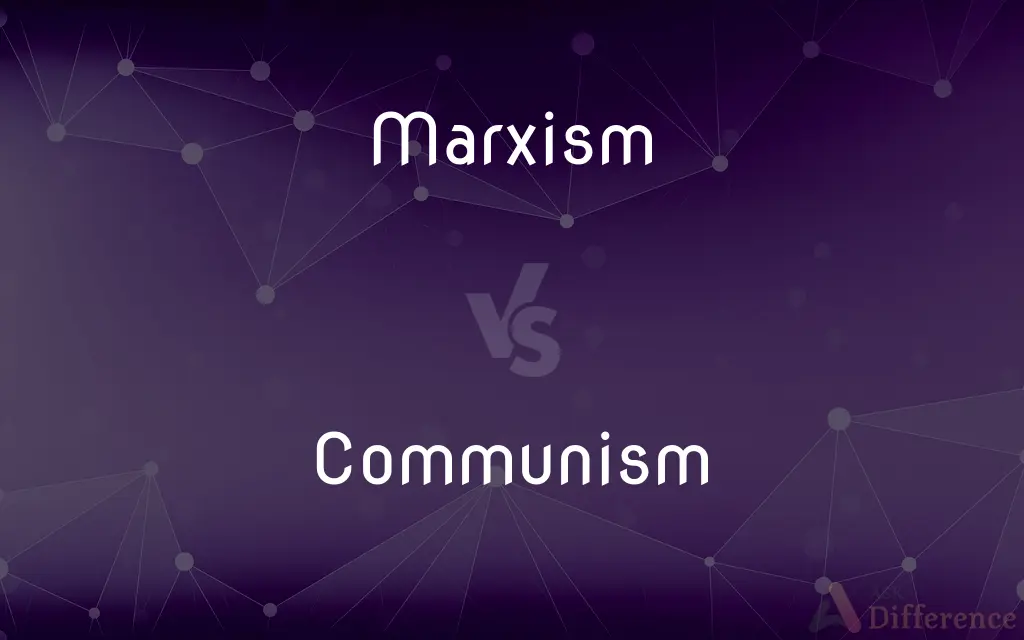Marxism vs. Communism — What's the Difference?
Edited by Tayyaba Rehman — By Fiza Rafique — Updated on September 22, 2023
Marxism is a social, political, and economic theory originated by Karl Marx that aims to establish a classless society through the abolition of capitalism. Communism is a form of government and social organization where property is publicly owned.

Difference Between Marxism and Communism
Table of Contents
ADVERTISEMENT
Key Differences
Marxism is a comprehensive ideology and framework for analyzing the social, economic, and political landscape, primarily through the lens of class struggle. It was developed by Karl Marx and Friedrich Engels and seeks to critique and dismantle capitalist systems. On the other hand, communism is a socio-economic system that aims for a classless society and collective ownership of the means of production. It is a form of government as well as a type of societal organization.
Marxism serves as the intellectual foundation upon which various forms of communism may be based. It provides the theories and critiques that inspire movements and policies aimed at achieving a classless society. Communism, conversely, is one of the political systems that can result from Marxist theory. It is a real-world application or attempt at realizing some of the ideas laid out by Marxism.
Both Marxism and communism aim for the establishment of a classless society, but they differ in scope and application. Marxism is broad, dealing with everything from philosophy to economics to culture. It offers an analysis of society and recommendations for change. Communism is more specific, focusing on the political and economic systems that should exist in a classless society. It is often seen as the end goal of Marxist theory.
While Marxism is primarily a critique and analysis, it doesn't lay out a detailed roadmap for achieving a classless society. Communism, as a political ideology, often comes with a more detailed plan or system for achieving this societal structure. Different countries have implemented versions of communism, often diverging from Marxist theory in significant ways. Marxism serves more as a lens for critique and understanding, while communism is a practical model, albeit one that may differ substantially from its theoretical underpinnings.
Comparison Chart
Origin
Developed by Karl Marx and Friedrich Engels
Various, often based on Marxism
ADVERTISEMENT
Scope
Broad, includes social, political, economic aspects
Specific, focuses on political and economic systems
Application
Theoretical framework for analysis
Real-world political and economic systems
Flexibility
Analytical lens, adaptable
Often rigid as an implemented system
Relation to Government
Not a form of government per se
Is a form of government and social organization
Compare with Definitions
Marxism
Marxism originated from the works of Karl Marx and Friedrich Engels.
Marxism has been influential in the field of sociology.
Communism
Communism is often seen as the practical implementation of Marxism.
Communism can be considered the end goal of Marxist theory.
Marxism
Marxism is primarily a critique of capitalism.
Marxism argues for the abolition of private property as a step toward equality.
Communism
Communism has been implemented in various forms across different countries.
The communism in the Soviet Union differed from that in Cuba.
Marxism
Marxism serves as a theoretical framework for various forms of communism.
Marxism lays the groundwork for the ideological shift toward communism.
Communism
Communism is a form of government where property is publicly owned.
In communism, the state often controls the means of production.
Marxism
Marxism is a social, economic, and political theory that aims to establish a classless society.
Marxism critiques the inequalities inherent in capitalist systems.
Communism
Communism focuses on collective ownership and cooperation.
In a communist society, individual wealth is less emphasized.
Marxism
Marxism deals with a broad range of societal aspects, including culture and philosophy.
Marxism has inspired a wide range of academic discussions beyond economics.
Communism
Communism aims for a classless society.
Communism seeks to distribute wealth more evenly among its citizens.
Marxism
Marxism is a method of socioeconomic analysis that uses a materialist interpretation of historical development, better known as historical materialism, to understand class relations and social conflict as well as a dialectical perspective to view social transformation. It originates from the works of 19th-century German philosophers Karl Marx and Friedrich Engels.
Communism
Communism (from Latin communis, 'common, universal') is a philosophical, social, political, and economic ideology and movement whose ultimate goal is the establishment of a communist society, namely a socioeconomic order structured upon the ideas of common ownership of the means of production and the absence of social classes, money, and, in some cases, the state. As such, communism is a specific form of socialism.
Marxism
The political and economic philosophy of Karl Marx and Friedrich Engels in which the concept of class struggle plays a central role in understanding society's allegedly inevitable development from bourgeois oppression under capitalism to a socialist and ultimately classless society.
Communism
A theoretical economic system characterized by the collective ownership of property and by the organization of labor for the common advantage of all members.
Marxism
Alternative case form of Marxism
Communism
A system of government in which the state plans and controls the economy and a single, often authoritarian party holds power, claiming to make progress toward a higher social order in which all goods are equally shared by the people.
Marxism
A system of economic and political thought, originated by Karl Marx, and elaborated by others. It holds that the state has been the a device for suppression of the masses, allowing exploitation by a dominant (capitalistic) class; that historical change occurs through class struggle; and that the capitalist system will inevitably wither away to be superseded by a classless society.
Communism
The Marxist-Leninist doctrine advocating revolution to overthrow the capitalist system and establish a dictatorship of the proletariat that will eventually evolve into a perfectly egalitarian and communal society.
Marxism
The economic and political theories of Karl Marx and Friedrich Engels that hold that human actions and institutions are economically determined and that class struggle is needed to create historical change and that capitalism will untimately be superseded by communism
Communism
Any far-left political ideology or philosophy advocating holding the production of resources collectively, especially by seizing it through revolution.
Communism
Any political social system that implements a communist political philosophy.
Communism
The international socialist society where classes, money, and the state no longer exist.
Communism
A scheme of equalizing the social conditions of life; specifically, a scheme which contemplates the abolition of inequalities in the possession of property, as by distributing all wealth equally to all, or by holding all wealth in common for the equal use and advantage of all.
Communism
A form of socialism that abolishes private ownership
Communism
A political theory favoring collectivism in a classless society
Common Curiosities
Is Communism always based on Marxism?
Not necessarily; communism can exist without Marxist influence, although Marxism often serves as its intellectual foundation.
What does Marxism aim to abolish?
Marxism aims to abolish capitalism and the class structures it perpetuates.
What is the primary goal of Communism?
The primary goal of communism is to establish a classless society with public ownership of the means of production.
What is Communism?
Communism is a form of government and social organization emphasizing public ownership and a classless society.
Is Marxism a form of government?
No, Marxism is not a form of government; it is a theoretical framework for analyzing society.
Can Marxism exist within other political systems?
Marxism serves as an analytical lens and can critique any political system, including democracies.
What is Marxism?
Marxism is a social, economic, and political theory aiming to create a classless society through the critique of capitalism.
Does Communism eliminate private property?
Generally, communism advocates for the collective ownership of property, effectively eliminating private property.
Is Communism the same as socialism?
No, communism is a more specific form of government, whereas socialism is a broader concept that can exist in various forms.
Who originated Marxism?
Marxism originated from the works of Karl Marx and Friedrich Engels.
How does Communism address social inequality?
Communism aims to eliminate social inequality through collective ownership and a classless societal structure.
Is Marxism only about economics?
No, Marxism encompasses social, political, and cultural critiques as well.
Is Marxism the same as socialism?
No, while both critique capitalism, Marxism is a more comprehensive theoretical framework, and socialism can exist without Marxist influence.
Have countries successfully implemented Communism?
Various countries have attempted to implement communism, but success is subject to interpretation and debate.
How does Marxism view class struggle?
Marxism views class struggle as the driving force behind historical change and social transformation.
Share Your Discovery

Previous Comparison
Excursion vs. Tour
Next Comparison
Troponymy vs. TroponymAuthor Spotlight
Written by
Fiza RafiqueFiza Rafique is a skilled content writer at AskDifference.com, where she meticulously refines and enhances written pieces. Drawing from her vast editorial expertise, Fiza ensures clarity, accuracy, and precision in every article. Passionate about language, she continually seeks to elevate the quality of content for readers worldwide.
Edited by
Tayyaba RehmanTayyaba Rehman is a distinguished writer, currently serving as a primary contributor to askdifference.com. As a researcher in semantics and etymology, Tayyaba's passion for the complexity of languages and their distinctions has found a perfect home on the platform. Tayyaba delves into the intricacies of language, distinguishing between commonly confused words and phrases, thereby providing clarity for readers worldwide.














































